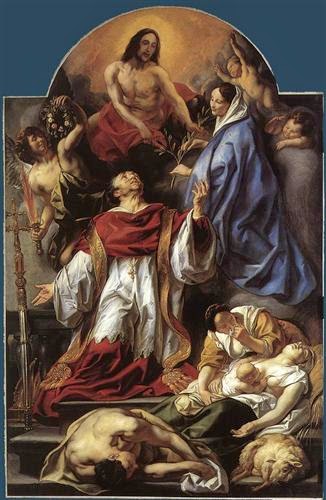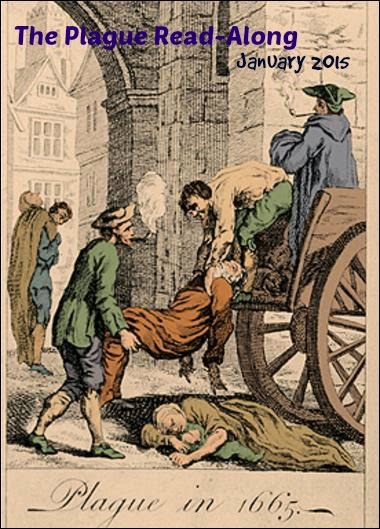I’m reading The Plague by Albert Camus as part of a read-along with Bookstooge.
Part III & Part IV
As the deaths from the plague mount, the town runs out of coffins and room in the cemetary. Eventually the victims are disposed of in much the same way as the rats early in the story. Yuck! Reality appears to set in on the collective group and the citizens of Oran feel united in their plight. Cottard continues to make money amid the suffering, Rambert decides to stay in Oran, in spite of being given a new plague serum M. Othon’s young son dies in agony, Father Panaloux delivers a fiery sermon and then succumbs to a sickness which does not resemble the plague, Tarrou confesses his history and we find he is in rebellion against societal systems which are “plagues” themselves, and Grand is found wandering the streets ill and somewhat disoriented. He is expected to die but he recovers and soon 4 other patients follow suit. Has the plague finally run its course?
 |
| St. Charles cares for the plague victims of Milan (1655) Jacob Jordaens source Wikiart |
Thoughts: In these two parts Camus deals in depth with the psychological effects of the plague, but not only this particular plague. Tarrou recounts how horrified he was at his father’s behaviour in his vocation as a lawyer; how he advocated for the death of defendents without any compassion or thought. Tarrou directly left this kind of life, joining societies that would fight against it, only to find that the very people who condemned these actions, would commit them themselves, if they thought the ends justified the means. Disgusted by people in general and referring to their actions as a type of a “plague”, Tarrou has placed himself in voluntary exile, removing himself and trying to live by “sympathy.”
Alienation appears to be a central theme. Rieux must alienate himself from his feelings to continue to work, Cottard feels more in tune with group suffering but in reality he is still alienated, of course as mentioned above, Tarrou is alienated, the citizens of Oran are alienated from the rest of the world as they are in quarantine, and each person, to an extent, is alienated from another in fear of catching the plague.


